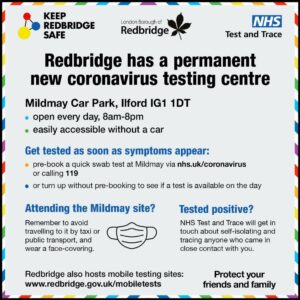COVID-19 Risk Factors Question and Answers
You may have heard that people from Black, Asian and Minority Ethnic (BAME) communities have worse outcomes and are more susceptible to getting coronavirus. Below are some questions that are frequently asked about increased risk for people from BAME communities and some advice on how to reduce these risk factors.
Q1. How can I best protect myself from COVID-19 and prevent the spread of disease to others?
Answer: There are several steps you can take to protect yourself and others from COVID-19 including:
- Self-isolation – If you have, or are showing symptoms of, coronavirus (a new continuous cough, or fever, or a loss of, or change in, your normal sense of taste or smell, or have someone in your household who is, you and everyone in your household should be self-isolating at home following the stay at home guidance.
- Get a test – if you think you have symptoms of Coronavirus, however mild, get a test. You can go online to www.gov.uk/get-coronavirus-test or phone the NHS on 119 to book a test at your local testing centre, or get a home test kit. Redbridge has a permanent testing centre at Mildmay Car Park, Ilford, IG1 1DT. It is open every day 8am-8pm

- Social distancing – Maintain at least 2 metres from anyone not in your household, and/or follow specific guidance in restaurants or other leisure establishments. Remember that social distancing only means keeping yourself physically distant from other people when you are outside your home. You can still be sociable with other people, which is really important for our mental wellbeing – WhatsApp, Facetime or even a phone call are great ways of keeping in touch with people.
- Hand hygiene – Clean your hands regularly, washing them for 20 seconds with water and soap, or using hand sanitiser.
- Respiratory hygiene – Avoid touching your mouth, eyes and nose. Cover your mouth and nose with disposable tissue/the crook of your elbow when coughing/sneezing. Dispose of tissues immediately and clean your hands. ‘catch it, bin it, kill it’
- Face coverings – If you can, wear a face covering in enclosed public spaces where social distancing isn’t possible. Face coverings must be worn on public transport and in shops. Wearing a face covering does not stop you from catching the virus, however if you are infected but have not yet developed symptoms, it may provide some protection for others you come into close contact with. A face covering can be as simple as a scarf or piece of cloth covering your nose and mouth.
Key message: Stay at home if you have COVID-19 symptoms, keep 2 metre distance from people outside your household, follow good hand and respiratory hygiene and wear face coverings where advised.
Q2. Am I at higher risk from COVID-19 because I am elderly and what support is available to me?
Answer: If you are over 70, you may be clinically vulnerable and could be at higher risk of severe illness from COVID-19. Public Health England published a review in June which looked at the differences in outcomes from COVID-19 for different population groups. This review noted that increasing age is a risk factor associated with COVID-19 related mortality. Of those who have COVID-19, individuals 80 or older when compared to those under 40 were seventy times more likely to die. If you are over 70, at moderate risk from coronavirus, you can go out to work (if you cannot work from home) and for things like getting food or exercising. But you should try to stay at home as much as possible. If you do go out, take particular care to minimise contact with others outside your household or support bubble.
In terms of support available, several supermarkets have dedicated spots for the elderly. The Coronavirus well-being service is available to support those that are at greatest risk including those over 70, living on their own and don’t have the necessary support while self-isolating. Redbridge CVS also has a directory of services available to help residents, including Age UK.
Key message: If you are over 70, you can go out to work and for things like getting food or exercising but are advised to stay at home as much as possible. If you do go out follow strict social distancing guidelines. For further help and support you can call the Coronavirus Wellbeing Service on 0208 708 5555 or visit www.redbridge.gov.uk/coronavirus-information-hub/coronavirus-well-being-service.
Q3. How does COVID-19 affect me if I have diabetes and what can I do about this?
Answer: Individuals with all types of diabetes are more susceptible to developing severe illness if they get COVID-19. The PHE review notes that diabetes (type 1 and 2) was mentioned on 21% of death certificates where COVID-19 was also mentioned (compared to 15% in all cause death certificates). This proportion was higher in all BAME groups compared to White ethnic groups and was 43% in the Asian group and 45% in the black group. The prevalence of type 2 diabetes is known to be higher in people from BAME communities.
People with diabetes are in the clinically vulnerable group and should stay at home as much as possible, and if you do go out, be careful to avoid contact with people you don’t live with. You should also take steps to keep your blood glucose levels well controlled to help reduce your risk of becoming ill, by keeping to a healthy diet, trying to keep active and regularly testing your blood glucose if advised by your doctor.
Key message: Diabetes increases vulnerability to developing severe illness from COVID-19, therefore managing your diabetes well is key to preventing complications from COVID-19. Ask your GP for further advice on how to manage your diabetes, or go online to www.nhs.uk/conditions/Diabetes
Q4. Is obesity associated with increased risk from COVID-19?
Answer: Several studies have shown a relationship between increasing BMI and COVID-19, with increased risk of adverse outcomes in obese or morbidly obese people. The PHE review reported 7.7% of patients critically ill in ICU with COVID-19 were morbidly obese, compared to 2.9% of the general population. Those who are morbidly obese are classed as clinically vulnerable and advised to stay at home as much as possible, and if they do go out to follow strict social distancing guidelines.
This highlights the importance of weight management though eating a healthy diet and regular physical exercise. Locally in Redbridge there is support available e.g. Exercise on Referral and the healthy start scheme.
Key message: Obesity is related to higher risk of severe illness from COVID-19, highlighting the importance of promoting a healthy lifestyle though exercise and a healthy diet. For more information about maintaining a healthy weight see www.nhs.uk/live-well/healthy-weight .
Q5. Does smoking increase my risk of COVID-19, and what help is available to help me quit?
Answer: Smoking is associated with an increased risk of developing respiratory viral infections such as COVID-19. Smoking damages your lungs, and airways and harms the immune system, reducing your ability to fight infection. Smoking also involves repetitive hand-to-face movements, which increase the risk of viruses entering the body. Smoking is also a risk factor for non-communicable diseases like cardiovascular and respiratory disease which put people with these conditions at higher risk of developing severe illness when affected by COVID-19. Stopping smoking will bring immediate benefits to your health. There is support available to help you stop smoking via the Redbridge Stop Smoking Service.
Key message: Smokers have an increased risk of contracting COVID-19, and of more severe symptoms once infected; stopping smoking will bring immediate benefits to your health. Call the Redbridge Stop Smoking Service run by Everyone Health on 0333 005 0095 or visit mylife.redbridge.gov.uk/stop-smoking
Q7. Are those working in public facing jobs at greater risk of COVID-19?
Answer: Some occupations require close or frequent contact with other individuals, which leads to an increased risk of COVID-19 infection. The PHE review noted that men working as security guards, taxi drivers and chauffeurs, bus and coach drivers, chefs, sales and retail assistants, lower skilled workers in construction and processing plants, and men and women working in social care had significantly high rates of death from COVID-19. Among workers in occupations that are more likely to be in frequent contact with people and exposed to the disease, one in five are from BAME groups. It is therefore important to practice good hand hygiene, social distancing as much as possible, and follow public health guidance while at work.
Key message: Occupations requiring close contact with others may lead to increased risk of COVID-19, highlighting the importance of practicing good hand hygiene. social distancing and following public health guidance at work. For more information see www.gov.uk/government/publications/staying-alert-and-safe-social-distancing/staying-alert-and-safe-social-distancing-after-4-july#going-to-work
Q8. How can I look after my mental health and wellbeing during this time?
Answer: It is normal to feel sad, stressed, anxious or scared during this time. You may also be concerned about your health or that of those close to you. It is important that you take care of your mind as well as your body and get support if you need it. There are several ways to look after your mental health and wellbeing detailed in this guidance. In Redbridge, Talking Therapies is available to help support you with a range of mental health conditions including depression, anxiety, stress and bereavement.
Key message: It is important to take care of your mental health and wellbeing, and seek out support if needed. Call Talking Therapies on 0300 300 1554 – Option 1, open 9am to 5pm Monday to Friday. For more information on taking care of your mental health see www.nhs.uk/conditions/stress-anxiety-depression

